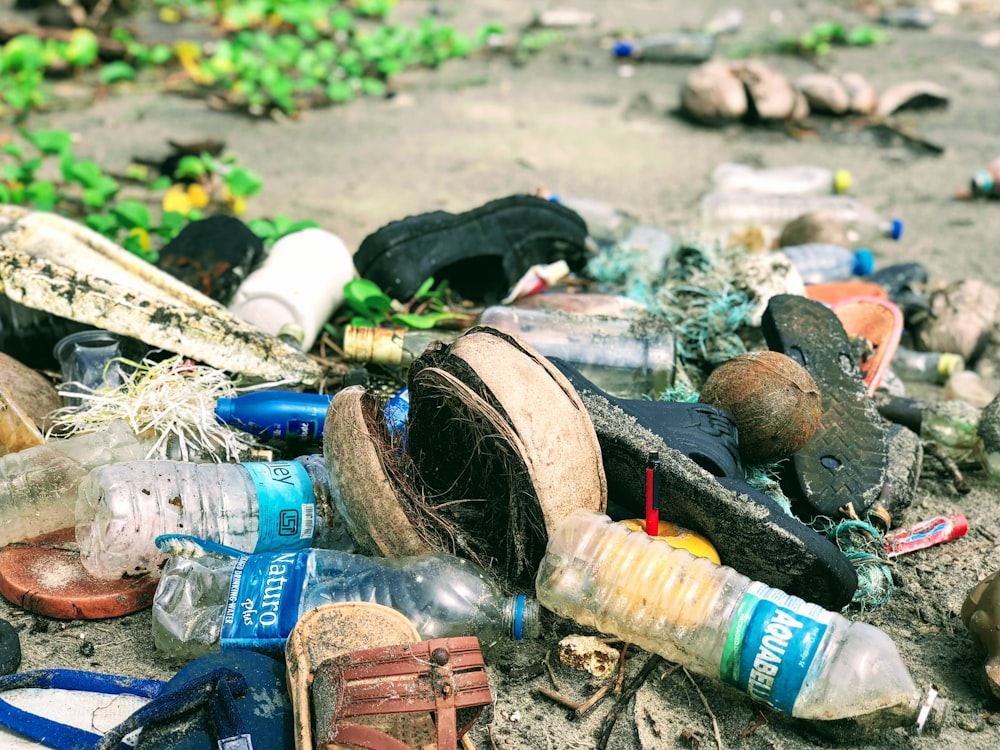CHOOSE TO REFUSE SINGLE USE PLASTIC
We all need to work towards eliminating single use plastics. Plastic itself is a great and useful product but should be made from recyclable materials and used over and over. Single use plastics are releasing toxins from landfill and choking our waterways and oceans.
Plastic has been found in almost every food we eat. Recent Italian research, reported in Environmental Research claims microplastics are being absorbed into fruit and vegetables. Fruit typically has older root systems than vegetables and are seen to absorb more plastic particles.
We need to adopt alternatives to plastic. I have listed a few beginner swaps to reduce the plastic in your life.
EASY STEPS TO USE LESS PLASTIC
Here are some easy ideas to replace your single use plastics.
1. Find replacements for cling wrap. Use glass jars or glass containers with lids that are strong and suitable for frequent use. Silicone, stretchy covers seal dishes well. I bought some expensive silicone covers which were stiff and a bit of a struggle to stretch over bowls but have lasted a long time. I also bought some cheaper ones which were softer and easier to use but have stretched out of shape. Lesson learnt.
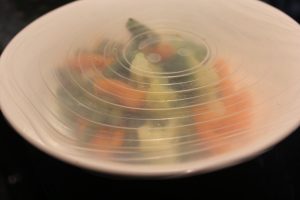

Waxed fabric wraps are also popular and can go in the compost when they wear out. I could never get them to stay securely on things in the fridge. They never sealed well. I also use clear shower caps on large bowls I use for bread making. My mother uses saucers to cover bowls in the fridge.
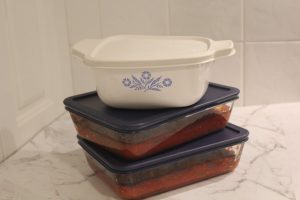

2. Buy a “keep” cup, a reusable covered cup you can get filled at your coffee shop, but this might not work during the CV-19 pandemic. You’ll probably have to ask when you order. A set of reusable cutlery is handy, too. Ours is in a fabric roll I made. It is light and compact.


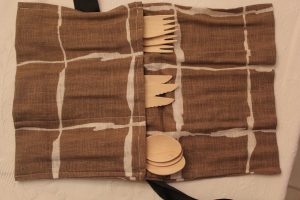

3. Try buying everyday staples from bulk supply shops. You can fill your own glass jars with flour, sugar, oatmeal pulses and many other products. I can buy flour in bulk from a bread making supply shop.
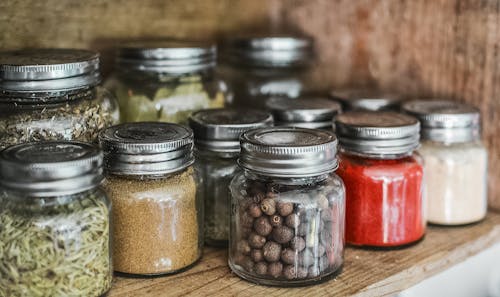

4. Is your soap wrapped in plastic? There’s so many paper wrapped or not wrapped at all bars of soap available. Unfortunately, I prefer liquid soap at the basin, so buy it in bulk in recyclable bottles which I decant into old pump bottles. I’ve tried making my own which was not a success and have found a bulk supplier nearby so will go there when I’ve used up my supply.
5. Apart from taking your own bag shopping, take small, light (netting) bags for buying loose fruit and vegetables. We can buy F&V in little, reusable thick paper bags but if I suddenly see something I need and don’t have a bag I get one from the mushroom area where they always offer paper bags.
6. Shopping online was great during isolation but a real problem when things arrived in layers and layers of plastic. I ordered three clothing items from the same company and they arrived in three individual bags in two very big, thick plastic bags. I have commented in the customer satisfaction email they later sent, but no response, yet.
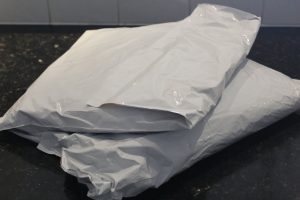
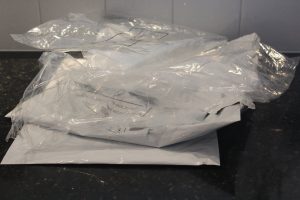

7. If you subscribe to magazines which arrive in the post, ask when you order if they are posted in paper or compostable, eco- friendly wrappers. Two of my subscription magazines from overseas are posted in big paper envelopes and they arrive safely every month. Another comes in an eco- friendly, 100% compostable wrapper with the message “Please dispose of it in your home compost bin, food waste caddy or green bin.” My Australian magazines come in plastic, but I’m hopeful this will change.
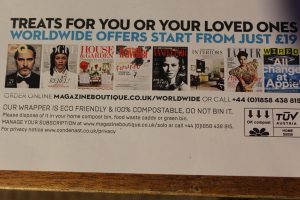

8. Check if online to see if your tea bags are plastic free. Many brands still seal the bag with a plastic product. Apart from the problem with the plastic entering the environment, some chemicals can leach into liquids at high temperatures.


After being introduced to a lovely fruit infusion at my local cafe ( I’d already had two double espressos) I’m ordering it as loose leaves and will make it in a teapot, just like they do!
7. Reduce the number of cleaning products bought in plastic bottles. Some time ago I started making and using MIRACLE SPRAY ( formula freely available online) I have decided it works better than the range of products I used to buy and use. I make several litres at a time and decant it into old spray bottles which I will replace with glass when they become brittle. It smells fresh, costs very little and does a good job. It is not recommended for use on granite and marble so I use detergent and hot water to wipe down those areas. I also use old clothes as cleaning cloths which I wash and reuse. Mine are old sheets and clothes but I’ve seen really fancy ones on blogs where the clothes are cut into perfect squares, hemmed and folded neatly into pretty piles.
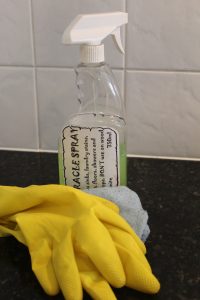

8. Some butchers will pack your meat into your own containers. Just ask. Nearly all bakeries will wrap your bread in tissues and put your pastries in cardboard boxes or trays. Ask if you can buy milk in glass bottles.
9. Takeaway food is a dilemma. So much of it comes in polystyrene or plastic boxes with plastic cutlery. Pizza comes in a recyclable box which goes in your compost or recycling bin . Pizza can be eaten with your fingers. Just saying!


Pizza in cardboard good, plastic drink bottle not so good.
10. I’ve reused some old plastic containers many times. For example, the plastic punnet some avocados came in is regularly used as a seedling box. I stand used toilet rolls in it, use a funnel ( made from rolled up scrap paper) to pour in seedling mix, pressed down to compact the soil, then poke the seeds into it. I spray the seed tubes and move them around indoors or in a sheltered area so they get good winter sun exposure. This means they’re ready to go at the end of winter.
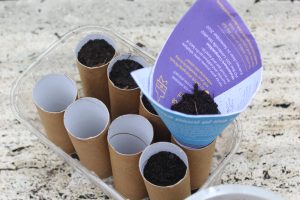

I use a dibbler to make a hole where I am going to plant the seedling, put the roll in and water as usual. By the time the seeds are ready to be planted out the cardboard is quite mushy and already disintegrating.
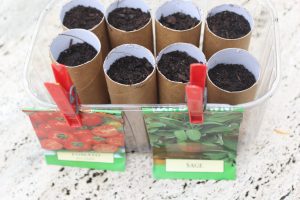

Planted tomato seeds and some sage seeds. I really like sage with chicken but my bush became woody and died, so I am replacing it.
Another way to get lots of “no plastic” hints is to ask your grandparents or elderly friends or neighbours for hints! Eco warriors before the concept existed, older people managed without home delivered takeaway, plastic packaging and huge super markets.
Please share your hints for minimizing the single use plastic in your life!

